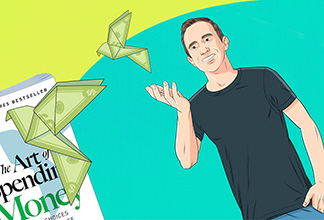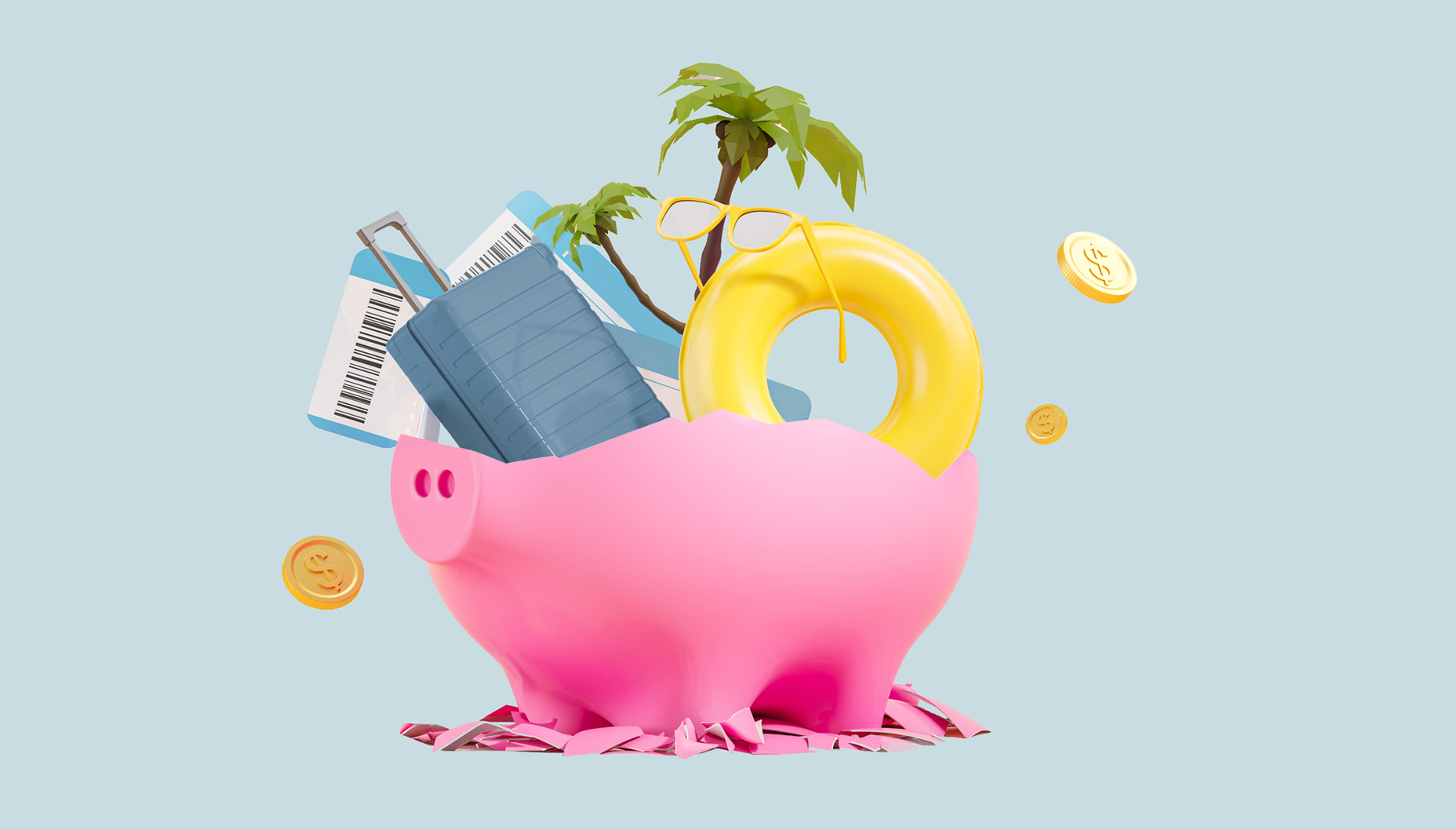Should You Spend Money on a Vacation or Invest Instead? Maybe Both
Written by The Inspired Investor Team
Published on June 11, 2025
minute read
Share:
With the summer travel season in full swing, social media feeds are filled with enviable posts of people visiting European cities and lounging at ocean-side resorts in the Carribbean. The photos, however, don’t usually include the cost of those trips or the shocked looks that might be on people’s faces when the post-vacation credit card statements come in.
Of course, travel can be enriching, providing memorable experiences and creating lasting memories, but some people tend to overspend on trips, whether that’s due to a social-media-driven fear of missing out or because they burned out and want to treat themselves. And as important as it is to get away, splurging on a trip, especially without planning, can set your financial goals back by weeks, months or even years. We look at the cost of getting away, and whether your money could be better invested for the future.
Travel costs climbing
Many Canadians list travel as a top goal, with one survey1 finding that almost two-thirds of Canadians prioritize travel above even homeownership or having children. But travel is getting more expensive. Using air fares as an example, Statistics Canada data2 shows that Canadians have seen flight costs jump by nearly 40 per cent over the past 10 years. (Inflation overall has risen by 30 per cent over the same time period.)
A recent Blue Cross survey3 revealed that 81 per cent of Canadian travellers have changed their travel habits due to rising costs, but many are still spending on big trips. Statistics Canada’s most recent national travel survey4 found that Canadians spent 20 per cent more abroad in 2024 than they did a year earlier, and nearly 44 per cent more than in 2019.
Let’s say you were hoping to save $4,200 for a trip next year, which is the amount a 2024 Blue Cross study5 says the average Canadian spends on a vacation. (That number could climb well beyond $10,000 for a family trip.) According to RBC’s Future Value Calculator, an investment of the same amount that returns 5 per cent over five years could come to $5,360, while over 10 years it could be $6,841. The return on investment might fluctuate over the investment window, but this example shows how returns could accumulate and compound over time.
You could put those dollars into a First Home Savings Account for a down payment or into a Tax-free Savings Account or Registered Retirement Savings Plan to grow your retirement funds.
Ways to both spend and invest
Of course, travel can help reduce stress and increase overall life satisfaction6, plus it’s a way to spend quality time with loved ones, so cutting out vacation altogether may not be the wisest move.
One way to both invest and travel is to take the money you’d spend on a vacation in one year and invest it for the next. You could also take a trip within Canada – as more people are doing recently7 – which could be more cost-effective than travelling abroad. (Not to mention you’d be paying in Canadian dollars, which will help your wallet.)
If you can, say, cut your trip costs in half, you could spend $2,100 rather than $4,200 on vacation and invest the rest. Using the same RBC calculator, $2,100 invested at 5 per cent over five years could grow to $2,680, and over 10 years could be $3,420. You could then put the additional savings toward other financial goals.
Another potential way to both invest and save for future travel is to own income-producing investments. For example, investors who hold dividend stocks receive a dividend payout they can either reinvest or use as income. While dividends aren’t guaranteed (they can be cut or eliminated, especially in tough economic times), many companies have a long track record of paying them.
Make trips part of your plan
The bottom line: as fun and rewarding as travel can be, overspending can make it hard to save for other financial needs. By taking some money you’ve set aside for travel and investing it, you could have a better chance of achieving all of your goals, including spending more on travel later on. The key is, when possible, to start investing early and regularly, so you can give your money time to grow over a longer time frame.
Sources
1. Business wire, “Homeownership, or Travels: Canadian Generations are Shaping Different Life Milestones and Financial Goals - FlightHub Survey”, May 2025
2. Statistics Canada, “Consumer Price Index, monthly, not seasonally adjusted”, May 2025
3. Blue Cross, "2025 Blue Cross Travel Study”, 2025
4. The Globe and Mail, "FOMO-driven burnt-out Canadians are spending on travel, even when it clashes with life's other financial goals”, June 2025
5. Blue Cross, "Blue Cross Travel Study”, 2024
6. Emerald insight, “The psychophysiological effects of travel: a horizon 2050 paper”, September 2024
7. Statistics Canada, “The Daily: Screened passenger traffic at Canadian airports”, April 2025
RBC Direct Investing Inc. and Royal Bank of Canada are separate corporate entities which are affiliated. RBC Direct Investing Inc. is a wholly owned subsidiary of Royal Bank of Canada and is a Member of the Canadian Investment Regulatory Organization and the Canadian Investor Protection Fund. Royal Bank of Canada and certain of its issuers are related to RBC Direct Investing Inc. RBC Direct Investing Inc. does not provide investment advice or recommendations regarding the purchase or sale of any securities. Investors are responsible for their own investment decisions. RBC Direct Investing is a business name used by RBC Direct Investing Inc. ® / ™ Trademark(s) of Royal Bank of Canada. RBC and Royal Bank are registered trademarks of Royal Bank of Canada. Used under licence.
© Royal Bank of Canada 2025.
Any information, opinions or views provided in this document, including hyperlinks to the RBC Direct Investing Inc. website or the websites of its affiliates or third parties, are for your general information only, and are not intended to provide legal, investment, financial, accounting, tax or other professional advice. While information presented is believed to be factual and current, its accuracy is not guaranteed and it should not be regarded as a complete analysis of the subjects discussed. All expressions of opinion reflect the judgment of the author(s) as of the date of publication and are subject to change. No endorsement of any third parties or their advice, opinions, information, products or services is expressly given or implied by RBC Direct Investing Inc. or its affiliates. You should consult with your advisor before taking any action based upon the information contained in this document.
Furthermore, the products, services and securities referred to in this publication are only available in Canada and other jurisdictions where they may be legally offered for sale. Information available on the RBC Direct Investing website is intended for access by residents of Canada only, and should not be accessed from any jurisdiction outside Canada.
Explore More

How Inflation-Proof Are Your Investments?
Why inflation still matters – and how to stay ahead of it
minute read

What Investors Should Know About the Precious Metals Market
Factors influencing silver, platinum and palladium
minute read

The Art of Spending: 5 Takeaways from Morgan Housel’s New Book
Ideas for how to build a healthier relationship with money and how you spend it
minute read
Inspired Investor brings you personal stories, timely information and expert insights to empower your investment decisions. Visit About Us to find out more.







